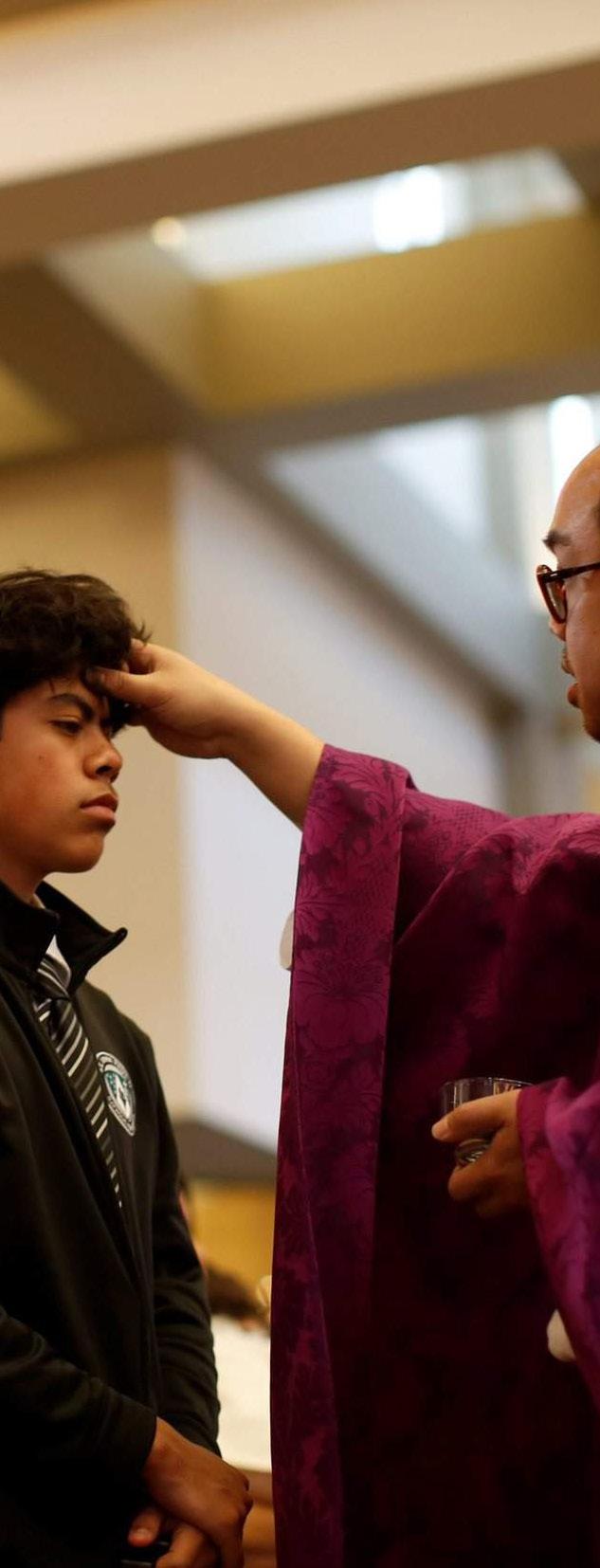
Having a faith conversation with old and new friends is as easy as setting the table.


Having a faith conversation with old and new friends is as easy as setting the table.



Introduction to FAITH FEEDS 3
Conversation Starters 6
• Family and Faith by Claudia H. Herrera-Montero 7
Conversation Starters 9
• Young People as Street Preachers by Ken Johnson-Mondragon and Lynette De JesusSaenz 10
Conversation Starters 12
• Young Hispanics Revitalizing the Church in the U.S. by Hoffsman Ospino 13
Conversation Starters 15
• Gathering Prayer 16


The FAITH FEEDS program is designed for individuals who are hungry for opportunities to talk about their faith with others who share it. Participants gather over coffee or a potluck lunch or dinner, and a host facilitates conversation using articles from the C21 Center’s biannual magazine, C21 Resources.
The FAITH FEEDS GUIDE offers easy, step-by-step instructions for planning, as well as materials to guide the conversation. It’s as simple as deciding to host the gathering wherever your community is found and spreading the word.
All selected articles have been taken from material produced by the C21 Center.

Who should host a FAITH FEEDS?
Anyone who has a heart for facilitating conversations about faith is perfect to host a FAITH FEEDS.
Where do I host a FAITH FEEDS?
You can host a FAITH FEEDS in-person or virtually through video conference software. FAITH FEEDS conversations are meant for small groups of 10-12 people.
What is the host’s commitment?
The host is responsible for coordinating meeting times, sending out materials and video conference links, and facilitating conversation during the FAITH FEEDS.
What is the guest’s commitment?
Guests are asked to read the articles that will be discussed and be open to faith-filled conversation.
Still have more questions?
No problem! Email church21@bc.edu and we’ll help you get set up.

Decide to host a FAITH FEEDS. Coordinate a date, time, location, and guest list. An hour is enough time to allocate for the virtual or in-person gathering.
Interested participants are asked to RSVP directly to you, the host. Once you have your list of attendees, confirm with everyone via email. That would be the appropriate time to ask in-person guests to commit to bringing a potluck dish or drink to the gathering. For virtual FAITH FEEDS, send out your video conference link.
Review the selected articles from your FAITH FEEDS Guide and the questions that will serve as a starter for your FAITH FEEDS discussion. Hosts should send their guests a link to the guide, which can be found on bc.edu/FAITHFEEDS.
Send out a confirmation email a week before the FAITH FEEDS gathering. Hosts should arrive early for in-person or virtual set up. Begin with the Gathering Prayer found on the last page of this guide. Hosts can open the discussion by using the suggested questions. The conversation should grow organically from there. Enjoy this gathering of new friends, knowing the Lord is with YOU!
Make plans for another FAITH FEEDS. We would love to hear about your FAITH FEEDS experience. You can find contact information on the last page of this guide.

Here are three articles to guide your FAITH FEEDS conversation. We suggest that you select two that will work best for your group, and if time permits, add in a third. In addition to the original article, you will find a relevant quotation, summary, and suggested questions for discussion. We offer these as tools for your use, but feel free to go where the Holy Spirit leads. Conversations should respect and ensure confidentiality between participants.
This guide’s theme is: Future Leaders - Hispanic Youth Ministry

By Claudia H. Herrera-Montero
“...Purity…every time that I pray to Mary I say: Que tu lúz brille [May your light shine] in my values and morals. I may not be pure completely, but I still have morals and values learned at home…” These are some of the words that Rosario quietly and reflectively shared when she was asked to share her understanding of Mary. Working as a Catholic campus minister in South Florida, I have had the opportunity to reach out to a diverse student body. Moreover, my social location as a Latina Catholic, who is also a mother, wife, and a recent doctoral graduate, has expanded my lenses to listen well to the everyday life of the young people with whom I work.
Similar to Rosario, a 20-yearold college student from Argentina, I have encountered a generation of Latino/a students who in addition to overcoming the transitions to young adulthood and all the seeking for meaning and purpose in life that comes with their generation, have to rethink, reflect, and live between two worlds. First there is the world that they have at home, constructed from the culture that their parents or grandparents brought with them from Latin America, and then there is the context of the U.S. culture into which they were born or raised, grew up, and now where they attend university—most often the first generation of their family to do so.
In my doctoral dissertation research with such young people, I
have used participatory action research (PAR) in order to explore the faith and religious identity of college age Latinas (women only) who were born or raised in the United States of immigrant parents from Latin America and who self-identify as Catholics, regardless of the level of their participation in a local church or ministry.
This theological and sociological approach provided a deeper understanding of the lives of young adult Latinas as well as their faithful Christian and resilient families that immigrated to the United States. Results from this research suggest that la familia (the family) functions as Iglesia domestica (domestic Church) and is the primary locus in which young adult Latinas encounter and participate as active members in their Catholic faith. By way of their moral faith formation within their families, memory and the heart play a critical role. Memory—interpreted as remembering or keeping in one’s heart—represents the favorite family narratives and stories that they heard from childhood. It includes the dangerous memories, such as the original immigration journey, the hard labor that parents and grandparents had to take on here, and the struggle in order to stay in this country. However, their family stories also highlight the redemptive memories of hope that sustained them, such as giving birth, breaking bread and sharing meals, praying to-
gether, being able to get a new job, or being the first generation of their family to graduate from college. These memories reaffirm and help to sustain resilient and faithful lives with a communal call and purpose. They also form young Latinas in a Christian ethic, with a keen sense of the call to social justice for all.
Primarily, Latinas reported affiliation with Catholicism because they first learned of God’s love for them and the love of their family and local community through the home. My research results suggest that Latinas’ faith and moral formation are learned from their families, particularly from their mothers though also from las abuelas (the grandmothers); these are the primary educators of Latinas’ faith. Also, through their families, Latinas continue to reimagine the symbols, rituals, teachings, and values of Catholic faith with the particularities of the church and the language of their countries of origin. Daily faith is constructed in light of the ordinary expressions of faith such las abuelas, or mothers’ daily prayers, blessings and consejos (teachings), approval of new friendships, encouragement to go to college, and so on. Expressions of faith, in most cases associated with Jesus, Mary, and the saints, represent acompañamiento de Dios (God’s accompaniment) that were found first in sacred places within the home. To quote another student from my research, Rosa:
When there is nothing else, when we do not have money or are sick, we always know that there is still someone who watches us all…my mom has a little altar in her room, so every time we feel that there is something wrong, we feel alone…she will always light a candle and just pray…we just pray there… it is like our little church inside home…it makes us feel better and we feel that we are not alone.
Rosa’s description of the little church inside her home suggests that the memories of family faith expressions come to mind for Latinas in times of sorrow, need, or decision making. Sacred places highlighted by Latinas are altarcitos (home altars), repisas (shelves), walls with holy water holders, and prayer rooms. Other sacred symbols are the medallitas (medals) they carry with them around their necks, hands, or in their backpacks that remind them of their values as faithful Catholic women. Moreover, Spanish is no longer simply a linguistic tool. It represents
the language of the heart from which they still enter into communion with God and their people. It is also clear from the research that young adult Latinas receive their moral formation within the family; as they grow up, they develop a sense of responsibility and duty from their parents. Results from my research with young adult Latinas who attend local universities and are, the first generation of their family to do so, attest that obtaining a college degree originates from the efforts of their families. It is primarily from their families that they receive the values of responsibility, sacrifice, steadfastness, discipline, and selflessness that enable them to make it through college. And their success in school is not built in isolation, but is shaped by their experience of the ongoing support and encouragement of their families. Their success in school represents and reflects the fruit of family prayer, hard labor, economic efforts to support them, and la lucha (the struggle) to survive in this country. To quote another Latina from my research:
My mom es una de esas madres que hace todo por sus hijos [she is one of those mothers who does everything for her children] … muere por sus hijos, moriría por sus hijos [she dies to herself for her children and she would die for her children]… and I think it is time to repay her and make her proud of me, because of all the effort she has put for me
The story of Rosario, la Merced, Rosa de Lima, and of other young Latinas unveiled throughout my research, reflect that la familia (family) becomes the domestic church where their voice and identity bloom in convivencia (to live with the lived experiences of the other). La vida en comunidad (the life in community) is a critical characteristic of faithful Christian Latinas. It is clear that nurturing the faith and morals of young Latino/as is primarily done in the family. Clearly, the Church must support, nurture, engage, and actively encourage las familias to be the primary sources of sowing and growing the seeds of faith in our young adults today. So it has always been; may the Church support this to continue.
CLAUDIA H. HERRERA-MONTERO, PhD, is a Catholic theologian and Assistant Professor at Dominican University.

“As the family goes, so goes the nation and so goes the whole world in which we live.”
- St. John Paul II
Claudia Herrera-Montero’s study describes the profound role that Hispanic families play on the faith and moral development of many young Latinas. While she focused her research on women, the experience of “living between two worlds” and being part of “faithful Christian and resilient families that immigrated to the United States” extends to youth across many cultures. Given the results of her research, that “la familia (the family) functions as the Iglesia domestica (domestic Church) and is the primary locus in which young adult Latinas encounter and participate as active members in their Catholic faith,” Herrera-Montero reveals the continuing need for church ministries to provide resources to support and encourage families on their faith journeys.
1. Knowing that “memory and the heart play a critical role” in the formation of faith, what stories would you share to inspire future generations?
2. Which traditions revealed in this article inspire your faith or give you ideas to spark traditions in your own families? Do you have traditions to share that others may appreciate learning?
3. How do you think that these families helped “develop a sense of responsibility and duty” in their children?

By Ken Johnson-Mondragon and Lynette De Jesus-Saenz
These days, we are witnessing an awakening in the Church to the importance of a ministry in a missionary key, and the centrality of encounter with Jesus and following him in all aspects of youth and young adult ministry. This type of ministry doesn’t develop out of nowhere. It requires enthusiastic leaders who are committed to their mission with young people, and above all among the young people themselves. As Pope Francis says, “How beautiful it is to see that young people are ‘street preachers’ (callejeros de la fe), joyfully bringing Jesus to every street, every town square and every corner of the earth!”
We are still far from accomplishing this vision. The reality is that after Confirmation, many young people opt to discontinue their spiritual journey with the Church. Among Latino immigrants, very few participate in parish youth groups. However, in some parishes there is a vibrant pastoral juvenil hispana (Hispanic youth and young adult ministry) led by the young people themselves, sometimes through an ecclesial movement, when and only if they are supported by the parish pastor. Children of immigrants often face specific challenges because many of them don’t fit in youth ministry in English or in pastoral juvenil in Spanish.
We must also pay attention to the programs themselves because the faith isn’t transmitted solely by knowledge of Church doctrine and history. Pope Francis tells us “Transmitting the faith requires forming habits of behavior; one must create the proper conditions for young people to receive the values that will prepare them. The first step in accompanying young people is to get to know them. More than half of young Catholics in the United States are Latinos, but they are not all the same. For example, some are young immigrants who identify primarily with their country of origin. Others have assimilated to American culture and seldom think of their Lat-
in American roots. A good number of them live in the midst of poverty and violence and they need role models to follow so as to avoid the great risks that come with their environment; many of them feel as if they’re neither from here nor there. And more and more there are young people who have adapted to American culture but maintain their Latino identity and their use of the Spanish language.
In order to effectively accompany young people, it is essential to know what is happening in their personal development and understand the parameters that define their reality. For example, the relationship between parents and children becomes complicated when they effectively are of different cultures and have different social horizons. Logically, this also affects the transmission of the faith from one generation to the next. Sometimes the parish wrongly supposes that if all of the young people in the group speak English, one program would be sufficient for everyone.
But research indicates that the more Latinos assimilate to American culture, the less they participate in religious programs. If parents don’t speak English well and ministry leaders don’t speak Spanish, it’s likely that religious formation won’t echo from the church to the home and vice versa. A close and trusting relationship between ministry leaders and parents is crucial to formulate a comprehensive ministry that responds to the real needs of the young people in the community.
What parents of immigrant families most hope for from their faith community is help with the socialization, religious formation, and protection of their kids in the midst of a cultural environment that presents many dangers. Therefore, it is imperative for pastoral leaders to take into account the perspectives and
concerns of young immigrants, in order to avoid undermining some of their most cherished values. Mutual, in-depth listening sessions between ministry leaders and families, whether formal or informal, are very valuable in order to reduce those risks. That is how to work toward what Pope Francis calls a “culture of encounter.”
When this is done well, the parish youth and young adult ministry or the apostolic movement usually serves as much as a resource for parents, as for the adolescents, and young adults, especially when cultural and generational differences bring them to a stand-still. Additionally, this creates a sense of belonging; that everyone is important and that everyone has something to contribute in the life of the community. In other words, it fosters communion and participation in the community, and the walls of separation and discrimination are brought down in favor of a “comprehensive, bilingual, and united pastoral juvenil, [which is capable] of creating new forms of evangelization.” The ideal is not a program imposed from the outside. It is a comprehensive response developed from within the community—with, by and for its young members.
How do we put this into practice? The young leaders at the First National Encounter for Hispanic Youth and Young Adult Ministry said that they are “idealists, dreamers and achievers seeking changes for a more caring world, following the ideals of Jesus.” When young Latinos encounter injustice or a lack of opportunities in their lives, some of them respond with anger and violence or they lose hope. But these same experiences present an opportunity to nourish their vision of a “utopia” and solidify their commitment to the Gospel. Like Pope Francis has said:
“Knowing how to guide and enable a young person in their idea of utopia is a treasure. What can I do to ensure that this young man’s desire, that this utopia leads him to encounter with Jesus Christ? Allow me to suggest the following. Utopia grows in a healthy way in a young person when it is accompanied by memory and discernment.”
According to the Pope, young people need teachers of discernment, capable of boring themselves with hours and hours of listening. In this “time wasted”
with adults in the community, the young people receive the historical memory contextualized in a life of faith.
Here is where we come full circle and return to the first principle of youth evangelization: “Do you know what the best tool is for evangelizing the young? Another young person.” But we can’t expect young people to accept their vocation as missionary disciples without support, formation and motivation. What motivates most is a vision and an invitation to make a difference in the world. Through methods of learning-by-doing, we must accompany them in carrying out their own ministry and invite them to take concrete actions of solidarity with young people who suffer from poverty and are marginalized, and to confront the throwaway culture. They are certainly going to stir things up, like Pope Francis has asked them to, but this is also a part of helping them grow in their social commitment. The Church must be willing to walk with them through this process.
If the faith of the current generation of young people is in need of renewal, the same applies to the practice of youth and young adult ministry. The leaders and ministers of youth ministry and pastoral juvenil need to rediscover the joy of dedicating themselves to forming young missionary disciples. They need to spend hours listening to the them to discover how to communicate the essential message of the Gospel in their language and culture, and then empower them to share the message with their peers. There is a certain freedom in that: as pastoral ministers, we don’t have to do everything ourselves. Rather, we are witnesses and facilitators of a hope-filled utopia that is always new and greater than we alone could ever imagine. This is falling in love with Jesus, his message and mission, young person to young person, to the ends of the earth.
KEN JOHNSON-MONDRAGÓN is Director of Pastoral Engagement at the California Catholic Conference.
LYNETTE DE JESÚS-SÁENZ is the Assistant Secretary of Parish Life in the Diocese of Cleveland.

Each one of you has to be God’s microphone. Each one of you has to be a messenger, a prophet.
- Saint Oscar Romero
This article discusses the spiritual formation of our youth and their potential to promote faith to their own and future generations. As it quotes, “Do you know what the best tool is for evangelizing the young? Another young person.” This ability comes through support and motivation. Many youth are inspired to “make a difference in the world,” but we, as a Church, must be willing to devote our time and accompany them through this process. As the article suggests, “when this is done well, the parish youth and young adult ministry… usually serves as much as a resource for parents,” as it does for the youth, creating a sense of community and belonging, despite language barriers and cultural differences.
1. Partnership between parents and ministry leaders is critical to creating “a comprehensive ministry that responds to the young people in the community.” What have you experienced or witnessed, or what ideas do you have, for fostering this “close and trusting relationship?”
2. A key theme throughout this article is the need to “listen” to our youth. How can we create these opportunities with and for them (in ministry, in their families, etc.)?
3. Ownership of their faith, discipleship, and work will make our youth effective and inspired leaders. How can we facilitate this growth and empower them?

By Hosffman Ospino
Gathered in Dallas, TX, for four days (Sept. 20-23, 2018), more than 3,400 Catholic leaders—the vast majority Hispanic—met for the highpoint celebration of a four year process called the Fifth National Encuentro of Hispanic/Latino Ministry (a.k.a., V Encuentro). Participants at the V Encuentro national meeting represented the voices of several hundreds of thousands of Catholics who had met in parishes, dioceses and regions to discuss current realities affecting the life of Hispanic Catholics and discern how the institutional Church in this country could better accompany the largest body of Catholics that is redefining its identity.
The atmosphere was electrifying! These Catholics were truly energized. Such energy reflected the depth and quality of their conversations during the years leading to the national meeting. I had the privilege to envision and write many of the resources used during the V Encuentro process.
One of its driving forces was to discern how the Catholic community in this country could respond more intentionally to the needs and hopes of young Hispanic Catholics, especially the U.S.-born generations. More strikingly, though, were the perspective and insight that young Hispanic Catholics participating in the V Encuentro
process brought into the conversation.
As soon as the national meeting began, it was clear that these young Catholics were not there to be the object of someone else’s reflection. They were there to let the rest of the Catholic community know who they were— their realities and frustrations—in their own words. They were there to share their vision for the Church. They reminded all those present that, as baptized women and men, along with others who share the Faith in Jesus Christ, they are the Church! They brought to life the words that Pope Francis would later write in his 2019 Apostolic Exhortation:
Dear young people, make the most of these years of your youth. Don’t observe life from a balcony. Don’t confuse happiness with an armchair, or live your life behind a screen. Whatever you do, do not become the sorry sight of an abandoned vehicle! Don’t be parked cars, but dream freely and make good decisions. Take risks, even if it means making mistakes. Don’t go through life anesthetized or approach the world like tourists. Make a ruckus! Cast out the fears that paralyze you, so that you don’t become young mummies. Live! (Christus Vivit, n. 143)
No conversation about revitalization of Catholicism in the United States would be credible without paying attention to Hispanic Catholics. We do not have to spend much time imagining what the Catholic Church in the United States will look like tomorrow. Just look at our young Catholic people today. About 60 percent of all U.S. Catholics younger than 18 are Hispanic. Within the next two decades, these will be the young women and men raising the next generation of U.S. Catholics, supporting our Catholic communities and organizations and building the structures that will allow Catholicism to remain a vibrant voice in our society. Most young Hispanic Catholics live in the south and the west of the country, although they are also present in large numbers in nearly every large city. Hispanics in general are a very young population: they have a median age of 29. About half of all Hispanic Catholics are younger than 30.
It is true that during the last few decades, many young Hispanics have stopped self-identifying as Catholic. Millions of them have joined the ranks of the non-religiously affiliated. A sign of hope, however, is that Hispanics have the strongest retention rate in terms of religious affiliation among all Catholic groups in this country, including young people. What helps such a phenomenon is the (still) strong Catholic character of Hispanic cultures and families, particularly as embodied and sustained by immigrants from Latin America and the Caribbean. Although 94 percent of Hispanics younger than 18 are U.S. born, millions of them are being raised under the influence of at least one Catholic immigrant adult at home. Investing in Hispanic Catholic families and affirming the religious and cultural values of immigrant adults remains essential to support the Catholic identity of Hispanic Catholic youth.
The presence of young Hispanic Catholics in parishes and dioceses is perhaps the biggest opportunity for ecclesial revitalization. They are there, waiting to be engaged! They are ready to witness the Faith they received from their parents and catechists. Will we as a Church seize the opportunity? There are about 8 million school-age Hispanic Catholics in our country. What are Catholic schools waiting for? This is not a time to close Catholic schools! On the contrary, it is time to strengthen those that we have, and open many more where these young Catholics live. Many pastoral leaders decry the decline of Catholic youth ministry programs. There are nearly 10 million Hispanic Catholics younger than 18 and about 7.5 million Hispanic Catholic millennials ready to be engaged in our ministries. What are we waiting for?
During the V Encuentro, and through a survey distributed nationwide, young Hispanic Catholics named—in their own voices—what they considered ought to be the priorities for the Catholic community as it accompanies them with pastoral care and evangelizing zeal. Among the various priorities they named, the following five stand out (I reword them here for brevity):
1.Intentional and more creative catechesis that engages the lived experience of young Hispanics and leads them to a truly transformative encounter with the risen Jesus Christ;
2. More opportunities to be educated for leadership in the Church and beyond;
3. Spaces to further discern their vocation as baptized women and men, and thus consider opportunities to serve the Church and society in light of that vocation;
4. Hispanic Catholic young people want to be acknowledged and embraced in their communities. They do not want to remain invisible. They do not want to be treated as second-class citizens;
5. Affirm their Catholic spirituality sustained by the best of the cultural, religious and social traditions present in their Hispanic roots. For them, being Catholic in the United States is not antithetical to being Hispanic; in fact, they find it essential. It is who they are!
It seems that with this set of priorities, young Hispanic Catholics offer the Catholic community in the United States an agenda for revitalization. Pope Francis recently reminded the Catholic world that, “To be credible to young people, there are times when [the Church] needs to regain her humility and simply listen, recognizing that what others have to say can provide some light to help her better understand the Gospel” (Christus Vivit, n. 41). Perhaps it is time for Catholics in the United States to listen to Hispanic Catholic youth and walk with them. After all, they are a major force shaping the present and the future of U.S. Catholicism.
Hosffman Ospino is an Associate Professor of Hispanic Ministry and Religious Education, and Chair for the Department of Religious Education and Pastoral Ministry at Boston College’s School of Theology and Ministry.

Let no one have contempt for your youth, but set an example for those who believe, in speech, conduct, love, faith, and purity.
- 1 Timothy 4:12
Based on the statistics and passion of youth described in this article, there is no doubt that young Hispanic Catholics are poised to share in the revitalization and leadership of the Church. Their presence creates a significant opportunity for its life and mission - through parishes, schools, and diocesan ministries. As author Hosffman Ospino indicates, the Fifth National Encuentro of Hispanic/Latino Ministry made it clear that our youth “were there to let the rest of the Catholic community know who they were” and to “share their vision of the Church.”
1. What opportunities can we create for youth to discern their vocation “as baptized women and men,” allowing them “to serve the Church and society?” And how do we continue to support them as they take on these important roles in life (from high school, to college, to first job, and beyond)?
2. Re-read the quote provided in the article from Pope Francis’ 2019 Apostolic Exhortation. How can we motivate each other, and our youth, to “not become the sorry sight of an abandoned vehicle” when it comes to our faith and our role as disciples?
3. How can we promote and affirm the beauty and intertwining of faith and tradition that comes from cultural roots?


